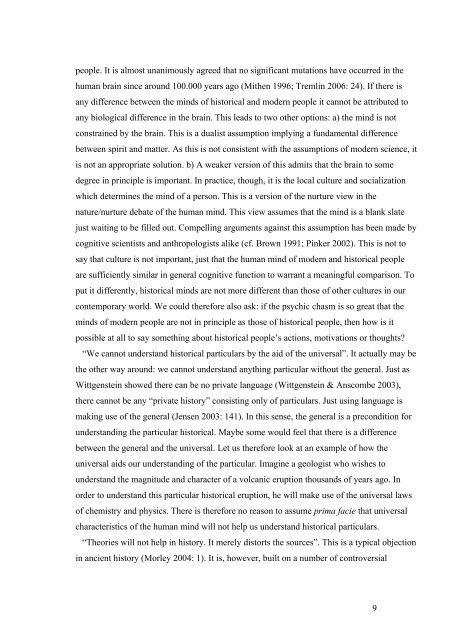The dissemination of divination in roman republican times
The dissemination of divination in roman republican times
The dissemination of divination in roman republican times
You also want an ePaper? Increase the reach of your titles
YUMPU automatically turns print PDFs into web optimized ePapers that Google loves.
people. It is almost unanimously agreed that no significant mutations have occurred <strong>in</strong> the<br />
human bra<strong>in</strong> s<strong>in</strong>ce around 100.000 years ago (Mithen 1996; Treml<strong>in</strong> 2006: 24). If there is<br />
any difference between the m<strong>in</strong>ds <strong>of</strong> historical and modern people it cannot be attributed to<br />
any biological difference <strong>in</strong> the bra<strong>in</strong>. This leads to two other options: a) the m<strong>in</strong>d is not<br />
constra<strong>in</strong>ed by the bra<strong>in</strong>. This is a dualist assumption imply<strong>in</strong>g a fundamental difference<br />
between spirit and matter. As this is not consistent with the assumptions <strong>of</strong> modern science, it<br />
is not an appropriate solution. b) A weaker version <strong>of</strong> this admits that the bra<strong>in</strong> to some<br />
degree <strong>in</strong> pr<strong>in</strong>ciple is important. In practice, though, it is the local culture and socialization<br />
which determ<strong>in</strong>es the m<strong>in</strong>d <strong>of</strong> a person. This is a version <strong>of</strong> the nurture view <strong>in</strong> the<br />
nature/nurture debate <strong>of</strong> the human m<strong>in</strong>d. This view assumes that the m<strong>in</strong>d is a blank slate<br />
just wait<strong>in</strong>g to be filled out. Compell<strong>in</strong>g arguments aga<strong>in</strong>st this assumption has been made by<br />
cognitive scientists and anthropologists alike (cf. Brown 1991; P<strong>in</strong>ker 2002). This is not to<br />
say that culture is not important, just that the human m<strong>in</strong>d <strong>of</strong> modern and historical people<br />
are sufficiently similar <strong>in</strong> general cognitive function to warrant a mean<strong>in</strong>gful comparison. To<br />
put it differently, historical m<strong>in</strong>ds are not more different than those <strong>of</strong> other cultures <strong>in</strong> our<br />
contemporary world. We could therefore also ask: if the psychic chasm is so great that the<br />
m<strong>in</strong>ds <strong>of</strong> modern people are not <strong>in</strong> pr<strong>in</strong>ciple as those <strong>of</strong> historical people, then how is it<br />
possible at all to say someth<strong>in</strong>g about historical people’s actions, motivations or thoughts?<br />
“We cannot understand historical particulars by the aid <strong>of</strong> the universal”. It actually may be<br />
the other way around: we cannot understand anyth<strong>in</strong>g particular without the general. Just as<br />
Wittgenste<strong>in</strong> showed there can be no private language (Wittgenste<strong>in</strong> & Anscombe 2003),<br />
there cannot be any “private history” consist<strong>in</strong>g only <strong>of</strong> particulars. Just us<strong>in</strong>g language is<br />
mak<strong>in</strong>g use <strong>of</strong> the general (Jensen 2003: 141). In this sense, the general is a precondition for<br />
understand<strong>in</strong>g the particular historical. Maybe some would feel that there is a difference<br />
between the general and the universal. Let us therefore look at an example <strong>of</strong> how the<br />
universal aids our understand<strong>in</strong>g <strong>of</strong> the particular. Imag<strong>in</strong>e a geologist who wishes to<br />
understand the magnitude and character <strong>of</strong> a volcanic eruption thousands <strong>of</strong> years ago. In<br />
order to understand this particular historical eruption, he will make use <strong>of</strong> the universal laws<br />
<strong>of</strong> chemistry and physics. <strong>The</strong>re is therefore no reason to assume prima facie that universal<br />
characteristics <strong>of</strong> the human m<strong>in</strong>d will not help us understand historical particulars.<br />
“<strong>The</strong>ories will not help <strong>in</strong> history. It merely distorts the sources”. This is a typical objection<br />
<strong>in</strong> ancient history (Morley 2004: 1). It is, however, built on a number <strong>of</strong> controversial<br />
9


